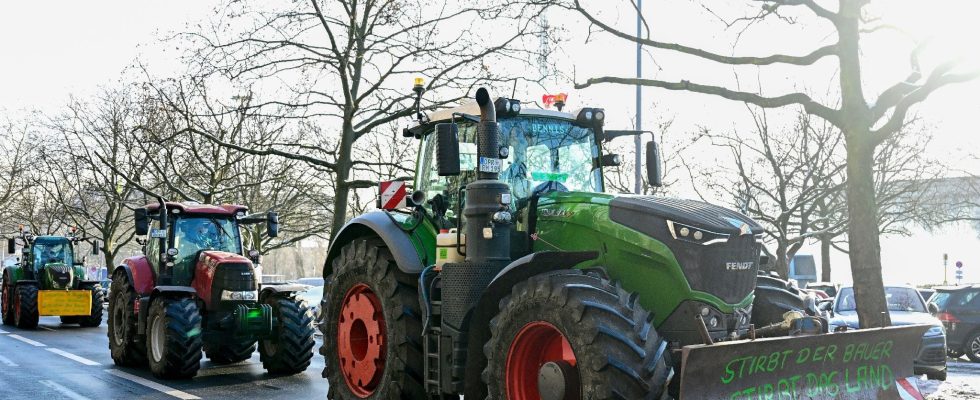Before the French, it was German farmers who banged their fists on the table. At the end of December, it was the reform of the taxation of agricultural diesel decided by the government of Olaf Scholz which ignited the powder. Beyond the elimination of tax advantages, the field of demands is just as vast as in France, ranging from “bureaucracy” to fluctuating income through criticism of environmental requirements. And their anger does not subside. On Friday January 26, more than 300 farmers from Brandenburg traveled to Berlin. With a total of 250 tractors, they demonstrated in front of the traffic light coalition party headquarters. Their grievances echo the grievances heard during the profession’s demonstrations in France.
In the German media, the farmers’ movement across the Rhine is scrutinized with a touch of irony. Let’s read an article from Der Spiegeltitled “Bauernprotest the French way“(French-style peasant demonstration”): the journalist sees it as a way for President Emmanuel Macron to recall “bad memories of the yellow vest revolt”, while the “right-wing populists rejoice in it”. In other articles from the German news site, we follow the demonstrations not far from the Franco-German border. Like in Alsace, near Lauterbourg, where French and German farmers blocked the bridge on a country road which connects Germany to the A35 motorway on the left bank of the Rhine towards Strasbourg.
At the beginning of January, while farmers blocked the roads, the Der Spiegel This question was already being asked: “Are farmers allowed to do what others are not allowed to do?” While the French executive made a series of announcements on Friday January 26, intended to appease farmers, its German counterpart does not seem ready to do the same. Olaf Scholz’s government is under pressure, facing a significant budget deficit. Faced with a strengthened far right and on the eve of several key elections, the weakened German chancellor is struggling to cope. While he had announced the gradual withdrawal of tax advantages on agricultural diesel, the promised support measures had not succeeded in making the pill go away.
Without us, nothing to eat”
After the massive demonstrations at the start of the year in Germany, farmers are maintaining pressure through one-off and decentralized actions. According to the Brandenburg Farmers’ Association, German farmers want to submit a list of demands to the federal offices of the country’s three main parties. Coincidentally, the annual agricultural fair organized this week in Berlin (“Grüne Woche”) offered them a choice forum. Among the farmers present, some wore green vests flocked with slogans often seen in demonstrations, such as “Without us, nothing to eat”. Proof that tensions continue, the president of the Land Parliament Gunnar Schellenberger (CDU) canceled this Saturday, January 27, the commemoration planned for National Holocaust Day because of farmers’ demonstrations.
Whether in Spain, Germany or even France, the European Union is singled out by demonstrators. In the new common agricultural policy, which came into force at the start of 2023, the EU has strengthened environmental obligations to receive part of the aid, on which 50% of German farmers’ income depends. These measures, criticized by agricultural organizations, aim to reduce the impact of European agriculture on the environment. Pesticides are responsible for the disappearance of 80% of insects on the continent, according to a 2017 German study. The IPCC estimates that the sector emits 23% of greenhouse gases produced by human activity worldwide.
Farmers complain of having to combine environmental virtue and profitability, in a context of volatile prices that they do not control, rising costs since the war in Ukraine and increased international competition. Especially since these new obligations are accompanied, according to them, by an increasingly significant “bureaucracy”, causing them to waste time and money. Jens Scherb, representative of the federation of German dairy farmers (BDM), says he spends “an hour a day with the papers” and “taking photos” to prove that he respects certain planting rules. “The urban and rural worlds have rarely been as antagonistic and different as today,” underlined the Die Suddeutsche Zeitung, daily newspaper from southern Germany. However, “rural and urban residents have never needed each other so much.”
